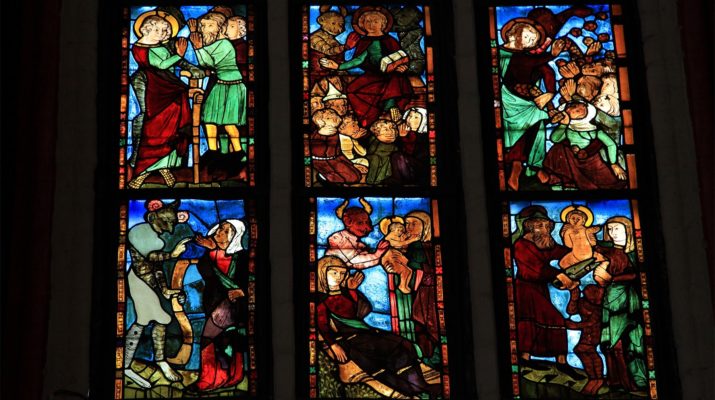2 Thessalonians 2:1-5, 13-17
Ordinary C50
1 As to the comingA of our LordB JesusC ChristD
A “coming” = parousia. From pareimi (to be present, have come) {from para (from beside, by, in the presence of) + eimi (to be, exist)}. This is presence, coming, arrival, advent. Properly, it was the term for an official visit of a king or someone else with formal authority. It is used specifically in the New Testament to refer to Jesus’s second coming.
B “Lord” = Kurios. From kuros (authority, supremacy). This is a respectful address meaning master or sir. It refers to one who has control or power greater than one’s own. So, it was also applied to God and Jesus as Master or Lord.
C “Jesus” = Iesous. From Hebrew Yehoshua (Joshua, the Lord is salvation); {from YHVH (proper name of the God of Israel; the self-existent and eternal one); {from havah (to become) or from hayah (to come to pass, become, be)} + yasha (to deliver, defend, help, preserve, rescue; properly, to be open, wide or free, which implies being safe. So, in a causative sense, this is to free someone)}. This is Jesus or Joshua in Greek – the Lord saves or the Lord is salvation.
D “Christ” = Christos. From chrio (consecrate by anointing with oil; often done for prophets, priests, or kings). Literally, the anointed one, Christ. The Greek word for Messiah.
and our being gathered togetherE to him, we begF you, brothersG and sisters,
E “gathered together” = episunagoge. 2x in NT. From episunago (to gather, assembly – to get together for a reason); {from epi (on, upon, what is fitting) + sunago (to lead together and so to assemble, bring together, welcome with hospitality, or entertain); {from sun (with, together with, closely associated) + ago (to lead, bring, carry, guide, go, drive)}}. This is an assembly or gathering. It can more specifically refer to congregating for Christian worship.
F “beg” = erotao. From eromai (to ask) OR from ereo (to say, tell, call, speak of). This is asking a question or making an earnest request. It is used between someone with whom the asker is close in some sense. So, they anticipate special consideration for their request.
G “brothers” = adelphos. From a (with, community, fellowship) + delphus (womb). This is a brother in a literal or figurative sense. It is also used of another member of the Church.
2 not to be quicklyH shakenI in mindJ or alarmed,K either by spiritL
H “quickly” = tacheos. 10x in NT. From tachus (quickly, promptly; without unreasonable delay). This is quickly, at once, soon, suddenly.
I “shaken” = saleuo. 15x in NT. From salos (tossing, agitation, rolling – like the sea swells). This is to agitate or shake up. It can mean to disturb, topple, incite, or destroy.
J “mind” = nous. From noos (mind) OR from the same as ginosko (to know, recognize, realize, perceive, learn; gaining knowledge through personal experience). This is mind, understanding, reasoning faculty, intellect, capacity to reflect. It can refer to God’s mind or human minds – thoughts, feelings, will, or reflective thinking.
K “alarmed” = throeo. 3x in NT. From throos (noise, tumult). This is to be disturbed, unsettled, troubled. It is feeling the desire to scream from fear, very upset, startled.
L “spirit” = pneuma. From pneo (to blow, breathe, breathe hard). This is wind, breath, or ghost. A breeze or a blast or air, a breath. Figuratively used for a spirit, the human soul or part of us that is rational. It is also used supernaturally for angels, demons, God, and the Holy Spirit. This is where pneumonia comes from.
or by wordM or by letter,N as though from us, to the effect that the dayO of the Lord is already here.P
M “word” = logos. From lego (to speak, tell, mention). This is word, statement, speech, analogy. It is a word that carries an idea or expresses a thought, a saying. It could refer to a person with a message or reasoning laid out in words. By implication, this could be a topic, line of reasoning, or a motive. It can be used for a divine utterance or as Word – Christ.
N “letter” = epistole. From epistello (to write, communicate through letter); {from epi (on, upon, against, what is fitting) + stello (to send, set, arrange, prepare, gather up)}. This is an epistle, letter, or other written message. This is where the word “epistle” comes from.
O “day” = hemera. Perhaps from hemai (to sit). This is day, time, or daybreak.
P “is…here” = enistemi. Related to “letter” in v2. 7x in NT. From en (in, on, at, by with, among) + histemi (see note N above). This is literally to place in or be at hand. Thus, it is to be present or the things that are present. It can also be something that is impending or instant.
3 Let no one deceiveQ you in any way,R for that day will not come unless the rebellionS comes firstT
Q “deceive” = exapatao. 6x in NT. From ek (from, from out of) + apatao (to deceive, seduce, cheat, delude; focuses on the method used to lure astray); {from apate (deception, cheating, treachery, fraud)}. This is to deceive of beguile. It focuses on the final effects of the deception.
R “way” = tropos. 13x in NT. From the same as trope (turning, change, shifting); from trepo (to turn). This is turning and taking on a new direction or manner. It can refer to way, fashion, style, or character. This is where the word “trope” comes from.
S “rebellion” = apostasia. Related to “letter” and “is…here” in v2. 2x in NT. From aphistemi (to remove, repel, refrain, depart from, foment a revolt, repel); {from apo (from, away from) + histemi (see note N above)}. This is rebellion, apostasy, falling away. It is going from the truth.
T “first” = proton. From protos (what is first, which could be the most important, the first in order, the main one, the chief); from pro (before, first, in front of, earlier). This is firstly, before, in the beginning, formerly.
and the lawlessU oneV is revealed,W the one destined for destruction.X
U “lawless” = anomia. 15x in NT. From anomos (literally without law; could refer to someone who disregards authority or one who is not under the law (i.e. a Gentile); lawless, wicked, or a transgressor); {from a (not, without) + nomos (what is assigned – usage, law, custom, principle; used for the law in general or of God’s law; sometimes used to refer to the first five books of the Bible or the entire Old Testament; also used to refer to theology or the practice and tradition of interpreting and implementing the law of God); {from nemo (to parcel out, assign)}}. This is lawlessness, disobedience, without law, violation. It is disregarding the law whether human or God’s law, including the harmful impact.
V “one” = anthropos. Probably from aner (man, male, husband) + ops (eye, face); {from optanomai (to appear, be seen); perhaps from horao (become, seem, appear)}. This is human, humankind. Used for all genders.
W “revealed” = apokalupto. From apo (from, away from) + kalupto (to cover, hide, conceal; figuratively, to keep hidden or secret) {related to kalube (hut, cabin)}. This is properly to uncover so it means revealing something that was hidden or obstructed. It particularly refers to revealing the essence of something. This is to make plain or manifest. This is the root verb that “apocalypse” comes from.
X “one destined for destruction” = huios + ho + apoleia. Literally, “son of destruction.” Huios is son, descendant – a son whether natural born or adopted. It can be used figuratively for other forms of kinship. Apoleia is 18x in NT. From apollumi (to destroy, cut off, to perish – perhaps violently; to cancel or remove); {from apo (from, away from) + ollumi (to destroy or ruin; the loss that comes from a major ruination)}. This is destruction, loss, something cut off, ruin, perdition. It can be any kind of loss whether tangible, spiritual, or eternal.
4 He opposesY and exaltsZ himself above everyAA so-calledBB godCC
Y “opposes” = antikeimai. 8x in NT. From anti (opposite, instead of, against) + keimai (to lie, recline, set, be appointed, be destined). This is to resist, oppose, or withstand. It can also be opposition, adversary, or enemy. This is to lie opposite or place against – being in irreconcilable opposition. Figuratively, it can be repugnant.
Z “exalts” = huperairo. 3x in NT. From huper (by, under, subordinate to another) + airo (raise, take up, lift, remove). This is elated, to exalt, lift, be arrogant.
AA “every” = pas. This is all or every.
BB “so-called” = lego. Related to “word” in v2. See note M above.
CC “god” = theos. From Proto-Indo-European origins, meaning do, put, place. This is God or a god in general.
or object of worship,DD so that he takes his seatEE in the templeFF of God,GG
DD “object of worship” = sebasma. 2x in NT. From sebazomai (to fear, be in awe, worship, adore); from sebo (to worship, revere, adore, be devout; properly this is personally placing a high value on someone or something, showing respect). This is object worship or devotion. For example, it could refer to a god or an altar.
EE “takes…seat” = kathizo. From kathezomai (to sit down, be seated); {from kata (down, against, according to, among) + hezomai (to sit); {from aphedron (a seat, a base)}}. This is to sit, set, appoint, stay, rest.
FF “temple” = naos. From naio (to dwell, inhabit). This is a place for God (or a god) to live – a sanctuary, shrine, or temple. It is a place for God or a god to manifest. For the Jewish Temple, it is used of the Temple itself and the two inner chambers.
GG “God” = Theos. Same as “god” in v4. See note CC above.
declaringHH himself to beII God. 5 Do you not rememberJJ that I told you these things when I was still with you?
HH “declaring” = apodeiknumi. 4x in NT. From apo (from, away from) + deiknumi (to show, point out, exhibit; figurative for teach, demonstrate, make known). This is to demonstrate by offering proof – showing that something meets its claims. It can also be showing off, exhibiting or, figuratively, to accredit.
II “be” = eimi. Related to “coming” in v1. See note A above.
JJ “remember” = mnemoneuo. From mnemon (mindful) OR from mneme (memory or mention); {from mnaomai (to remember; by implication give reward or consequence) or mimnesko (to remind or remember; memory through an active, intentional process or being mindful; not incidentally or accidentally remembering); or form meno (to stay, abide, wait, endure) or from massaomai (to chew, gnaw); from masso (to knead, squeeze)}. This is to remember, recollect. It does not necessarily imply remembering something that you forgot – it could be simply calling something to mind. It can mean to punish or rehearse.
13 But we mustKK alwaysLL give thanksMM to God for you,
KK “must” = opheilo. Perhaps from the base of ophelos (advantage, gain, profit); from ophello (heaped together, accumulate, increase). This is to be indebted morally or legally – having an obligation one must meet. This term came from the legal world, but was then adopted in reference to morality. In the New Testament it is used for humanity’s ethical responsibility.
LL “always” = pantote. Related to “every” in v4. From pas (see note AA above) + tote (then, whether past or future); {from hote (when); from ho (the)}. This is literally every when. It is always, at all times.
MM “give thanks” = eucharisteo. From eu (good, well, well done, rightly) + charis (grace, kindness, favor, gratitude, thanks; being inclined to or favorable towards – leaning towards someone to share some good or benefit; literal, figurative, or spiritual; grace as abstract concept, manner, or action); {from chairo (to rejoice, be glad; used to say hello; properly, delighting in the grace of God or experiencing God’s favor); from char– (to extend favor, lean towards, be inclined to be favorable towards)}. This is giving thanks, being thankful. It is a recognition that God’s grace is good and actively showing gratitude. It can also be used for saying grace before eating. This is where “eucharist” comes from.
brothers and sisters belovedNN by the Lord, because God choseOO you as the first fruitsPP for salvationQQ
NN “beloved” = agapao. Perhaps from agan (much). This is love, longing for, taking pleasure in. It is divine love or human love that echoes divine love.
OO “chose” = haireo. Related to “exalts” in v4. 3x in NT. Probably related to airo (see note Z above). This is to choose, prefer.
PP “first fruits” = arche. From archomai (to begin or rule); from archo (to rule, begin, have first rank or have political power). Properly, this is what is first. In a temporal sense, that is beginning or origin. It can also refer to the one who ranks first, i.e. king or ruler. So, it can also be magistrate, power, or principality. It can be used more generally for what is preeminent.
QQ “salvation” = soteria. From soter (a savior, deliverer); from sozo (to save, heal, preserve, or rescue; taking someone from danger to safety; delivering or protecting literally or figuratively); from sos (safe, rescued, well). This is deliverance, salvation, preservation, welfare, prosperity, safety.
through sanctificationRR by the Spirit and through beliefSS in the truth.TT
RR “sanctification” = hagiasmos. 10x in NT. From hagiazo (to make holy, consecrate, sanctify, set apart as holy, purify, venerate); from hagios (sacred, holy, set apart, different other; physically pure, morally blameless, or ceremonially set apart); from hagnos (holy, sacred, pure ethically, ritually, or ceremonially; prepared for worship, chaste, unadulterated, pure to the core; undefiled by sin; figurative for innocent, modest, perfect). This is consecration, sanctification, holiness. It is making something holy or holier, set apart, being purified.
SS “belief” = pistis. From peitho (to have confidence, urge, be persuaded, agree, assure, believe, have confidence, trust). This is less about knowing, believing, and repeating a list of doctrines then it is about trusting God. Faith means listening to God and seeking to live a holy life even (and especially) when we don’t understand how everything works or fits together. Faith is about being faithful (trusting and doing) rather than being all knowing.
TT “truth” = aletheia. From alethes (true, unconcealed; true because it is in concert with fact and reality – attested; literally, what cannot be hidden; truth stands up to test and scrutiny and is undeniable, authentic). {from a (not, without) + lanthano (unnoticed, concealed)}. Truth is literally that which is not or cannot be concealed. This word covers more than the sense of true versus false. It spoke of truth as that which corresponds to reality – reality as opposed to illusion. Thus, it includes, sincerity, straightforwardness, and reality itself.
14 For this purpose he calledUU you through our gospel,VV so that you may obtainWW the gloryXX of our Lord Jesus Christ.
UU “called” = kaleo. Related to keleuo (to command, order, direct); from kelomai (to urge on). This is to call by name, invite, to name, bid, summon, call aloud.
VV “gospel” = euaggelion. Related to “give thanks” in v13 & “gathered together” in v1. From eu (see note MM above) + aggelos (angel, messenger; a messenger from God bringing news – whether a prophet or an angel); {from aggellos (to bring tidings); probably from ago (see note E above)}. This is literally “the good news,” used for the gospel. This is also where “evangelism” comes from.
WW “obtain” = peripoiesis. 5x in NT. From peripoieo (to acquire, earn, preserve, make one’s own); {from peri (about, concerning, all around, encompassing) + poieo (to make, do, construct, cause)}. This is acquisition, possession, preservation.
XX “glory” = doxa. From dokeo (to have an opinion, seem, appear, suppose; a personal judgment; to think); from dokos (opinion). This is literally something that evokes a good opinion – something that connects to our understanding of intrinsic worth. The ultimate expression of this is, of course, God and God’s manifestation. So, this is opinion, honor, and dignity, but also praise, glory, renown, and worship.
15 So then, brothers and sisters, stand firmYY and hold fastZZ to the traditionsAAA that you were taughtBBB by us, either by word of mouth or by our letter.
YY “stand firm” = steko. Related to “letter” and “is…here” in v2 & “rebellion” in v3. 11x in NT. From histemi (see note N above). This is to stand fast or be stationary. Figuratively, it can mean to persevere.
ZZ “hold fast” = krateo. From kratos (strength, power, dominion; vigor in a literal or figurative sense; power that is exercised). This is being strong or mighty so, by extension, to prevail or rule. It can also mean to seize, grasp hold of and thereby control.
AAA “traditions” = paradosis. 13x in NT. From paradidomi (literally to hand over – hence to deliver, abandon, or betray. It implies a personal involvement); {from para (from beside, by) + didomi (give, offer, place, bestow, deliver; give in a literal or figurative sense)}. This is something handed down or handed over. So, it could be some kind of instruction, ordinance, or tradition. It can be used to refer to the tradition of the elders within Judaism.
BBB “taught” = didasko. From dao (learn). This is to teach, direct, instruct, or impart knowledge. In the New Testament, this is almost always used for teaching scripture.
16 Now may our Lord Jesus Christ himself and God our Father,CCC who lovedDDD us and through graceEEE gaveFFF
CCC “Father” = Pater. This is father in a literal or figurative sense. Could be elder, senior, ancestor, originator, or patriarch.
DDD “loved” = agapao. Same as “beloved” in v13. See note NN above.
EEE “grace” = charis. Related to “give thanks” in v13. See note MM above.
FFF “gave” = didomi. Related to “traditions” in v15. See note AAA above.
us eternalGGG comfortHHH and goodIII hope,JJJ
GGG “eternal” = aionios. From aion (an age, length of time). This is age-long, forever, everlasting. Properly, that which lasts for an age. This is where eon comes from.
HHH “comfort” = paraklesis. Related to “called” in v14. From parakaleo (to call to, summon, invite, request, or beg; to exhort or admonish; to encourage, comfort, or console; has legal overtones and is used of one’s advocate in a courtroom); {from para (beside, by, in the presence of) + kaleo (see note UU above)}. This is calling someone for help, a personal exhortation, comfort, encouragement, joy, entreaty, urging. This word comes from a legal setting – as bringing evidence to advocate for another in court. This word is related to the word “Advocate” or paraclete used for the Holy Spirit.
III “good” = agathos. This is good, a benefit, or a good thing. It is good by its very nature, intrinsically good. A different word, kalos, refers to external signs of goodness.
JJJ “hope” = elpis. From elpo (to anticipate, welcome, expect; usually to anticipate positively). This is expectation, hope, trust, confidence faith. The expectation can be abstract or concrete.
17 comfortKKK your heartsLLL and strengthenMMM them in every good workNNN and word.
KKK “comfort” = parakaleo. Related to “called” in v14 & “comfort” in v16. See note HHH above.
LLL “hearts” = kardia. Literally the heart, but figuratively mind, character, inner self, will, intention, thoughts, feelings. Also, the center of something. The word heart is only used figuratively in the Old and New Testaments. This is where “cardiac” comes from.
MMM “strengthen” = sterizo. Related to “letter” and “is…here” in v2 & “rebellion” in v3 & “stand firm” in v15. 13x in NT. This is to make fast, support, strengthen, establish, fix firmly, to go resolutely.
NNN “work” = ergon. From ergo (to work, accomplish, do). This is work, task, deed, labor, effort.
Image credit: “The Choir Windows in St Mary’s church, Frankfurt-an-der-Oder, Germany.” Photo by Mathieu Bertrand Struck, 2011.




